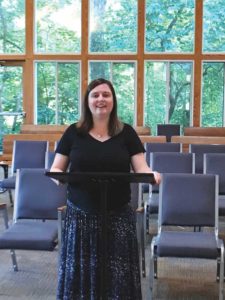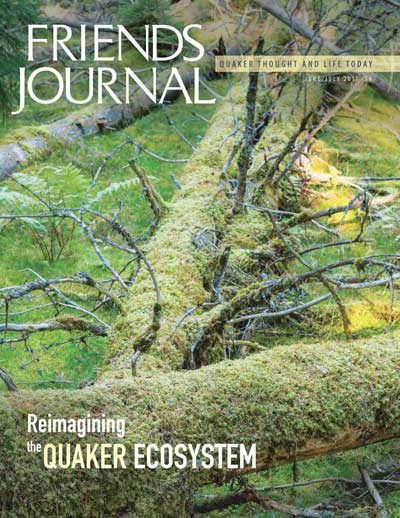
“But why go to seminary?”
I heard this question so many times in the months before I left for my first year of seminary. Usually, I would be sitting across the table from a weighty Friend, and the conversation would progress to how we don’t do that—Quakers don’t go to seminary. The honest answer is that I was going to seminary because I was burning out in ministry. I could not find a way to do the ministry that I was feeling led to do without hurting myself and others. I had the sense that seminary would give me tools for making ministry sustainable, something I desperately needed. At the same time, I felt a clear leading to be a minister among Friends, a denomination that is (at best) ambivalent about theological education.
I did not make the decision to go to seminary lightly. I resisted it for years. Finally, in a worshipful meeting with my ministry support committee, we all came to the conclusion that I was clear and this is what I was feeling led to do. It took me over two years after that meeting to wrap up my work and financial obligations so that I could begin the program. I chose Candler School of Theology, a Methodist graduate program at Emory University in Atlanta, Ga., because of its focus on leadership. I hoped to learn some of the ways Candler supported emerging leaders and bring those back to the Religious Society of Friends, a denomination that often views leadership with suspicion.
I was the only Quaker at Candler for my three years in the program. Some Friends expressed concern that going to seminary would take away my Quakerness, but the opposite was true: my professors and classmates took the fact that I am a Quaker very seriously. I constantly had to articulate Friends’ practices and beliefs, and translate those into theological language. Because I was the only one, I could not fall back on Quaker jargon. I gave vocal ministry out of the silence in preaching classes and analyzed how the way chairs are set up in a Quaker meetingroom reflects our understanding of the Divine. Going to a Methodist seminary made me a better Quaker.
Some people who are unfamiliar with seminary assume that it is three years of intellectual exercises. My experience was that it was three years of learning who I am in ministry. Candler focuses in particular on contextual education and requires two years of work in ministry contexts, one in a church setting and one outside, with constant feedback. I worked as a chaplain in a women’s prison and reflected on my strengths and weaknesses in ministry. I worked in my unprogrammed meeting and got practical experience in establishing boundaries and sustainable self-care practices. I spent a summer working in a programmed Friends meeting and learned how to incorporate what I was learning in classes in daily ministry. I wrote self-evaluations and got evaluations and feedback from professors, supervisors, and my peers. I learned some of the common pitfalls and patterns for ministers, and how to go to others when I found myself in those situations. I learned more about myself than I had ever imagined while also expanding my understanding of the expectations for someone in ministry.
At times, I could see how far I had come. Near the end of my second year, I had the opportunity to lead a weekend retreat for my meeting. I could feel the change in myself immediately. Nearly all of the content of the retreat was familiar—exercises I had used before—but I was different. I could see how Spirit was moving through me, and I felt freer, more confident, and grounded in a new way. Others sensed it too. For the first time, the feedback on the retreat was uniformly positive. People in my meeting commented on my ability to lead and the ways that I could bring our discussions back to focus. I watched with joy as Friends found new ways to articulate their experience of the Divine and engaged in spiritual practices together. By the end of the weekend, I was tired, but did not have the sense of burnout that was so often present before I began seminary. I was also grateful that my meeting recognized the value of my work and experience and compensated me for it. It gave me joy to share my gifts with my community and for the community to express its appreciation for them.
Probably the biggest concern that Friends expressed when I said I was planning to go to seminary was that it would be expensive, and they were worried I would not find a job afterward. Fortunately, Candler offers excellent financial aid, so my seminary education was not as expensive as it could have been. The second concern has proven to be well founded. I spent much of my third year of seminary applying for pastor positions in programmed Friends meetings, but Way did not open. I was disappointed as each door closed, and worried about my future.
Then, in early December, I told my friend Hannah Hill, an ordained Cooperative Baptist minister, a dream I had about preaching for women. I said that I was thinking about starting a Wednesday night worship, and Hannah immediately said that she would do that with me. We worked together to share elements of both of our traditions, and created Church of Mary Magdalene (named in honor of the first woman preacher). Our semi-programmed worship includes singing, scripture, a prepared message, and prayer. The weekly worship is deep, and we are thrilled that it is a place in Atlanta where the voices of women, queer people, and others on the margins are centered.
I am still working to make my ministry financially sustainable. In addition to Church of Mary Magdalene, I lead workshops and guest preach, and I do contract legal work to make ends meet. I also rely on contributions to support my ministry. It is hard and vulnerable for me to ask for money, both for the ministry I provide and in asking people to support the work I do through donations. Friends expect a lot for free. Asking for an honorarium for preaching means risking being called a “hireling minister”—and the honorarium often will not cover a week’s worth of groceries, let alone rent. I am sometimes envious of my friends in other denominations, where there are more obvious avenues for financial support for ministry.
I do not regret going to seminary. I felt clearly led to go, and I can see the ways it has strengthened and prepared me for the work ahead. I know that I am not alone in feeling led to go to seminary to deepen my ministry, and I am certainly not the only Quaker minister who is worried about money. It is a big financial risk to go to seminary however, and one that many Friends seem to be taking alone. It is not enough for us to say “Quakers don’t go to seminary,” because many do. Meetings need to go deep with those feeling called to seminary and find ways to support the ministers among us spiritually and financially.
For me, much of this comes down to how we understand ministry. If we believe that ministry is given through an individual for a community, we need to support that ministry—and that support includes financial support. I hope that Friends will understand the benefits that a seminary education brings to our community and invest in that by compensating ministers fairly for their time and experience as well as finding other ways to financially support the ministries among us. If not, we will get what we pay for.



I read this article yesterday and I so appreciated this perspective. I myself graduated with a Master of Divinity from Asbury Theological Seminary in 2015 (while living on campus of Anabaptist Mennonite Biblical Seminary where my husband attended). I did not start attending my Quaker meeting until after I received my degree, but I can confidently say my seminary experiences are what led me to Quakerism. We would do well to support those who have felt that seminary would be beneficial for their personal life or ministry purposes. I am now a hospice chaplain because of my degree, and am continuously looking for ways to bring the Quaker identity into it. Thank you for publishing this article.